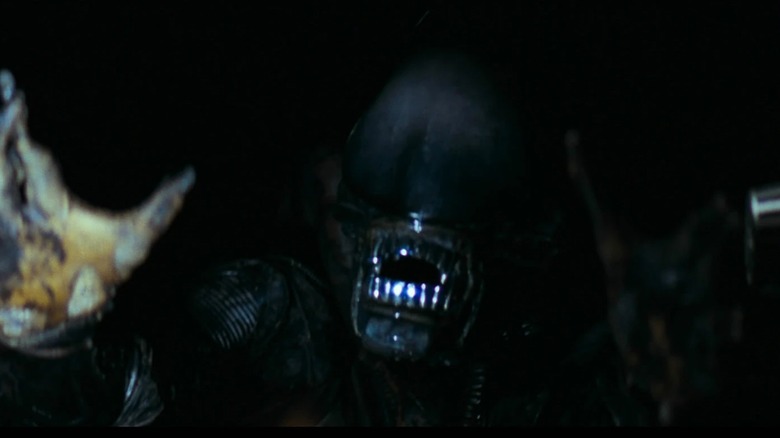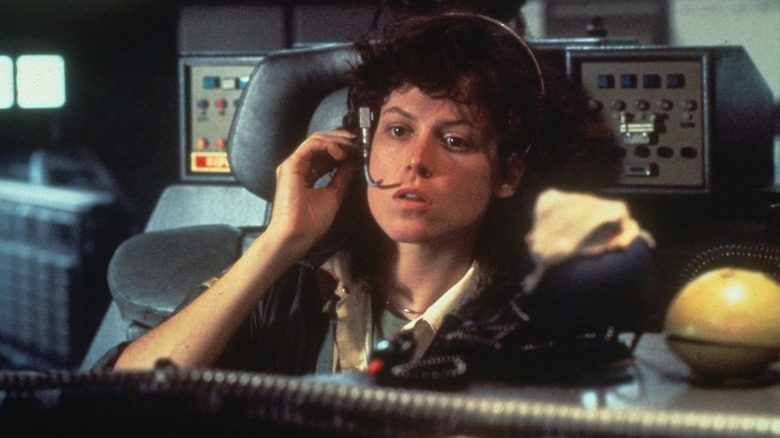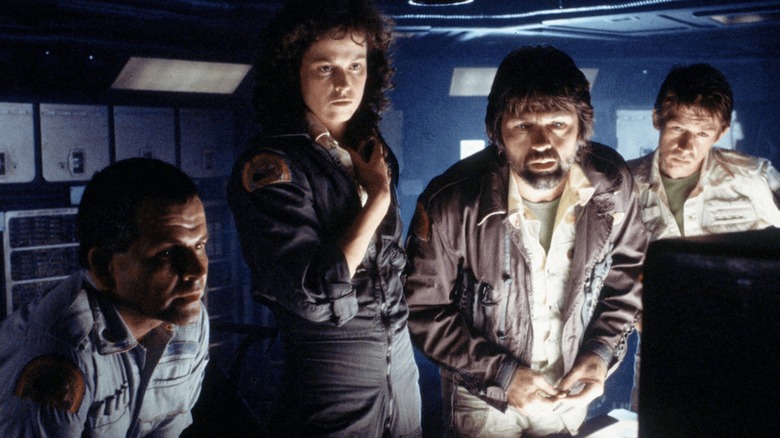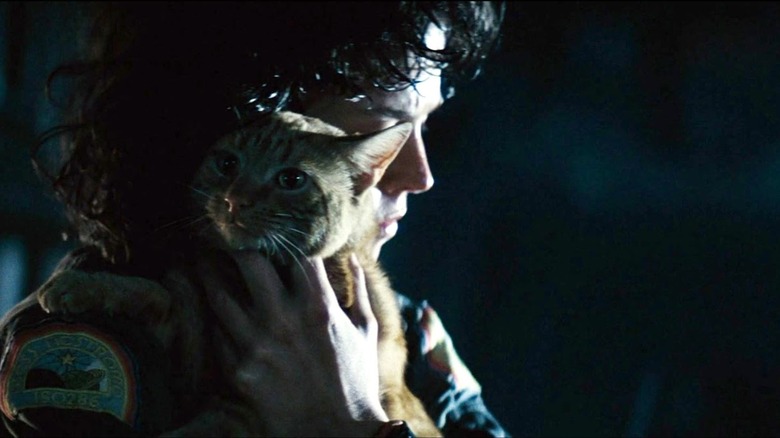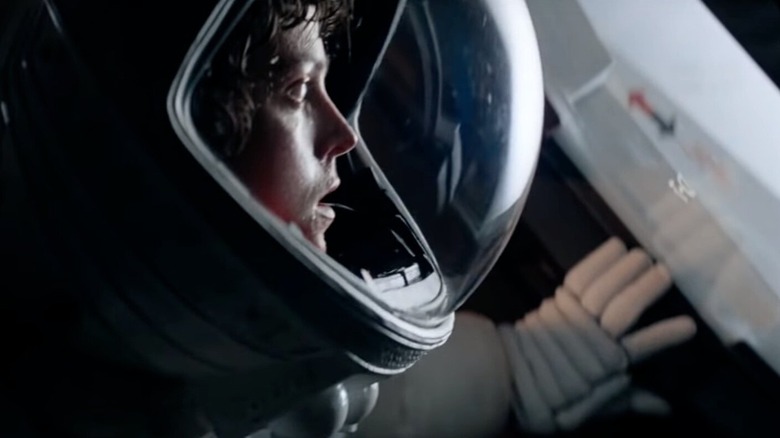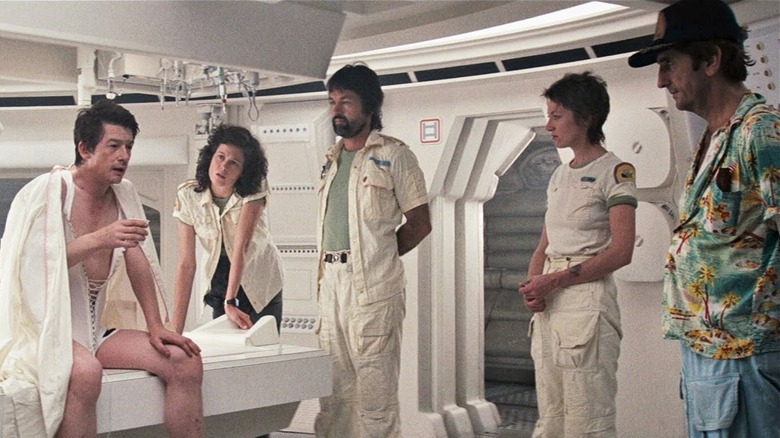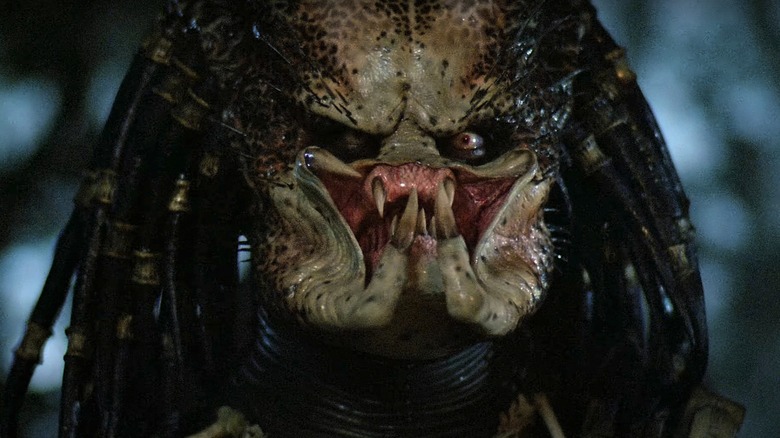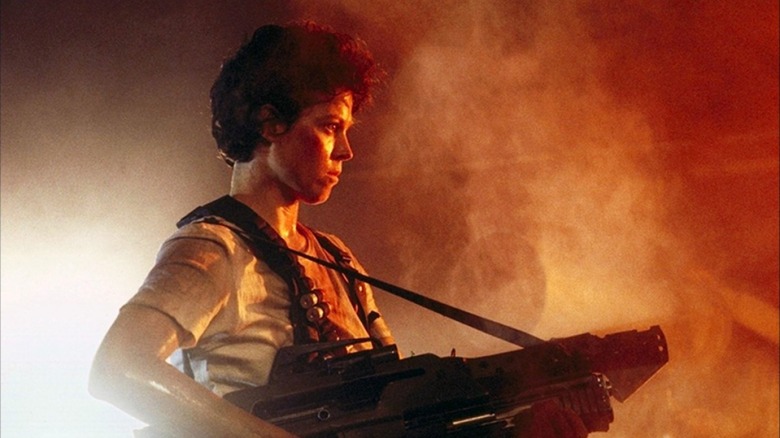The Disturbing Alternate Ending To Alien Explained
Ridley Scott's "Alien" changed the playing field for science fiction and horror in 1979. Starting with a haunted house story in space, Ellen Ripley (Sigourney Weaver) endures a never-ending nightmare that builds to a terrifying chase through an empty, self-destructing ship. Winding up in a locked room with the titular alien, best known today as the first Xenomorph in the franchise, Ripley's story is a triumph of human will versus the natural hell of space.
As with most films, the vision behind "Alien" went through a series of changes before it launched into theaters. Arguments with artist H.R. Giger over the religious and then psychosexual shape of the Chestburster eggs caused controversy early on, and an early preview of what would later become the Queen Xenomorph's ability to web up her egg hosts are hallmarks of the fandom. But there's one other huge change that, thankfully, never had a chance to make it to canon. Ellen Ripley, an icon of women in film, almost didn't survive her last encounter.
The original ending
The theatrical ending of "Alien" remains seared into fans' minds. It's a classic slasher sequence. Ripley, and Jonesy, an orange cat possessed of the fabled brain cell just long enough to not get himself into this horrorshow more than he must, have made it to the Nostromo's escape shuttle. The cat is secured in the cryo bed and Ripley strips down to her underwear. Her bare skin isn't shot for sexiness; it's a sign that she feels safe enough to make herself vulnerable.
There's a third passenger on the shuttle, though: a Xenomorph sleek enough to blend in with the tubed walls of the cramped ship. It announces its presence with a wiggle of its arm, more than enough to put Ripley — and us —back into panic mode. The finale provides a stress test for everyone as Ripley armors back up and waits with a frightened hare's patience until she can blow the monster out of the airlock with help from a small harpoon. Only then can she enjoy her well-earned but bittersweet ending.
The alternate ending
On the promotional circuit for "Alien: Covenant" in 2017, Ridley Scott revealed his original plan for a nightmarish and, frankly, cruel last-minute twist ending. The changes start once Ripley makes it to the shuttle, after she's prepped the cat and started readying herself for the long sleep. In this thankfully pruned variant universe, the Xenomorph launches its attack, and Ripley counters with the airlock gambit we know. This time, however, the harpoon doesn't work, and the critter launches itself forward into the ship, defying the call of space.
The Xenomorph then kills Ripley without much ceremony. According to Scott, it "slams through her mask and rips her head off." Then, showing the awful results of its evolution, it sits at the comms console, opens a channel, and mimics Dallas's (Tom Skerritt) voice perfectly. The film ends on another distress signal that's actually a deadly trap. Only this time, the theoretical hapless rescuers won't find a bay of eggs, much less the sleeping Ripley of the canon ending. All they'd get is a keenly intelligent monster. Let's be honest... this ending stinks.
The alternate ending would have killed the Alien franchise
Not only does that alternate ending produce a visceral reaction in anyone that's ever looked up to Ripley, but it also kills a 40-year-old blockbuster franchise in the cradle. While losing some of the "Alien" saga isn't all bad — we're looking straight at you, "Alien: Covenant," and don't get too cozy, either, "Alien Resurrection" — James Cameron's "Aliens" is at least as iconic as the original. That film not existing would be a blow to cinema history. More arguable, but we're willing to argue it for days, is "Prometheus," a misunderstood but elegant film that turns Scott's universe on its head. It also would've changed how sci-fi fans approached John McTiernan's "Predator," and kept several classic sci-fi horror films, like "Event Horizon," from ever being conceived.
A different kind of "Alien" franchise might have happened. Something anthological, like canon tie-in novels that tell of Xenomorphs attacking medieval-level societies, or wholly different encounters with the Colonial Marines. But anthological horror sagas are iffy gambles, as 1982's "Halloween 3: Season of the Witch" showed. Audiences connected with the humans of the Nostromo, and that's crucial to the franchise we know today.
20th Century Fox saved movie history
Ridley Scott went on to explain to an interviewer at Entertainment Weekly, back in 2017, how he pitched that alternate ending to Fox suits over the phone. As he describes it, the tension from the studio was audible on the line, with a long, uncomfortable silence punctuating Scott's description of Ripley's grisly end. Scott's bemused tale ends with an exec arriving on set fourteen hours later, who bluntly threatened to fire Scott on the spot if the film ended with Ripley's death.
Studio interference frequently negatively impacts a creator's vision, causing nightmare situations. Every once in a while, however, someone makes the right call and tragedy is averted. That Fox executive threat is one of those rare times, suggesting that Ridley Scott, like George Lucas, sometimes does his best work with someone around unafraid to tell him when an idea of his stinks. At least Scott's version of Jar Jar Binks (We love you, Ahmed Best) seems to be Michael Fassbender.
Can you view the alternate ending of Alien?
No one can watch Ridley Scott's horrifying twist ending. It was never filmed, nor storyboarded. It's only oral history, revealed during Scott's interview with Entertainment Weekly in 2017. At the time, EW's artists provided a concept sketch of the ending, which depicts the Xeno's unsettling baby mouth driving into Ripley's forehead. Provide your own oral sex insights.
It's also not the first time this infamous unmade ending was hinted at. A Reddit user noticed that this bleak piece of trivia appeared on IMDB more than 11 years ago, and the commentary track on the original "Alien Quadrilogy" box set, which features Scott and most of the main cast, verifies the find. Scarier yet is an unexplored anecdote several minutes earlier that leans into the film's sexually charged horror imagery in a way few mainstream fans are prepared for. Scott and Weaver discuss the awful sensuality of the Xenomorph, suggesting a "Beauty and the Beast"-style connection in the film's last moments.
What were some of the reactions to the unused ending?
The Fox executives certainly reacted, and thanks to them, the Xenomorphs continue to thrive. Based on the "Quadrilogy" commentary track, the cast's response to Ridley Scott's tale of the alternate ending was serene, going without much remark. John Hurt breaks the silence by discussing the film's legacy, with his bloody role as the first victim and unwilling Xenomorph dad, Kane.
Sigourney Weaver has never commented on the alternate ending, although her commentary along with Scott about the sexual undertones of the Xenomorph — and her gleefully weird clone Ripley in "Alien Resurrection" — suggest a professional who would've taken the bizarre finale in stride. Online fans on male-dominated forums seem the most eager to check out the potential ending, even suggesting it could've been better than the triumphant existing ending. There's a lot to unpack about the willingness to see a heroine mutilated and killed by an eldritch horror in a sexually suggestive way, but let's not.
Alien's alternate ending predicts the Predator's famous trick
There's zero evidence to suggest that director John McTiernan and his screenwriters, the sibling tandem of John and Jim Thomas, knew about the alternate ending to "Alien" when they crafted "Predator" in 1987, but it's a neat coincidence that their Yautja predator uses the same trick Scott once conceived for his Xenomorph. "Predator" uses human mimicry sparingly, with the hunter (Kevin Peter Hall) first practicing Mac's (Bill Duke) voice after Mac uses his knife to spear a scorpion on the shoulder of op leader Dillon (Carl Weathers).
The Yautja also imitates Billy's laugh (Sonny Landham), though it speaks English in its own rattling voice when face to face with Arnold Schwarzenegger's Dutch at the film's climax. Future movies use the trick to great effect, including turning Danny Trejo into bait in "Predators," but it's never against a Xenomorph in the (crappy) match-up movies. In retrospect, that's a missed opportunity. It's still a wild twist of fate that these franchises cross wires in this secret way. While the ability to mimic human speech makes zero sense for a Xeno, it worked perfectly for these clever, less mindlessly primal, intergalactic hunters.
The loss of Ellen Ripley would have been devastating
Worse than the loss of an iconic franchise, this unused ending deprives fans of one of the most iconic heroes in movie history. Ellen Ripley represented someone Gen X kids and their descendants could admire, especially in the girl-power-charged 1990s. Ripley has served as a benchmark for female heroes and protagonists ever since, appearing on multiple Best Of compilations, including a 2008 Empire list where Ripley placed 9th, as the highest-ranked female lead.
"Alien" also launched Sigourney Weaver into orbit, making her one of our favorite must-see actors. Ripley netted the then-fledging film star BAFTA and Saturn Award nominations. Without Ripley's strength, later roles, like the flighty and funny Diana from "Ghostbusters" or the Uhura surrogate Gwen DiMarco from "Galaxy Quest" wouldn't have happened. We'd have been all the poorer without Weaver, much less Ripley's legacy. We'd also have lost the chance to see a New Jersey high school put on the best school play of all time, with Weaver and Ridley Scott coming together to urge an encore performance. Through Ripley, all things are possible. Down with the Xenomorphs!
